Food equity is a global issue. It is also a local one.
In 2022, approximately one in five people in Island Grown Initiative’s estimated Martha’s Vineyard year-round population of 24,000 turned to the Island Food Pantry for food support. This number has doubled since 2019, when only one in 10 used the Food Pantry. In January 2023, Island Grown served 1,892 unique individuals, an 86 percent increase from the number of unique individuals it served in January 2022. And since the start of 2023, IGI is registering approximately 14 new households per week on average at its pantry. Note that the Food Pantry has a “no barriers to entry” policy. People simply fill out a very basic application form, with no proof of residency required. This card is then swiped when the clients come to shop for food. The number of swipes on each card is how IGI tracks and calculates their numbers.
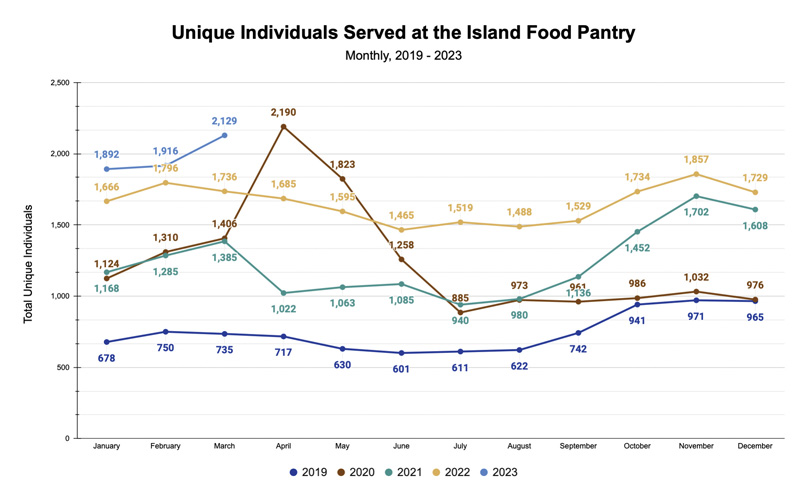
Since 2006, Island Grown Initiative has been rethinking, innovating, and collaborating to solve and create better food systems for the Island.
Edible Vineyard sat down with three of the many people at Island Grown working on this cause to hear about their efforts. Food equity director Merrick Carreiro, special projects manager Sadie Dix, and senior director of programs Noli Taylor spent several hours with us, delving into the need, the challenges ahead, and their plan for ensuring that all Islanders have access to nourishing, healthy food.
“We know that to thrive, people need adequate housing, good healthcare, education, and food,” Noli says. “We are trying to thoroughly address one of those four areas.”
“Yes, we can’t control some of the costs of living — increasing gas, utilities, or healthcare — but we can grow and make food. And so we’re growing, making, and delivering food in ways that we hope will make real, lasting change for our community,” Merrick adds.
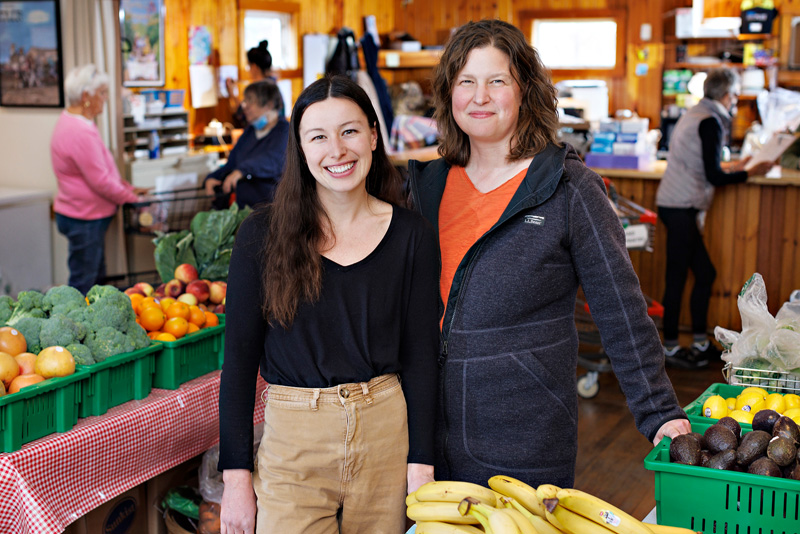
Merrick is the newest member of IGI’s team. “It took me a year to feel like I can own the title of food equity director,” she confesses. Before joining IGI in October 2021, Merrick spent the previous 10 years as co-owner of Tisbury’s Little House Cafe. “It was a labor of love — never about the bottom line. We tried to make it the go-to place for year-round residents. This feels, in some way, like the natural next step.”
Sadie, who recently graduated from the Tufts Friedman School of Nutrition Science and Policy, earning a master’s degree in nutrition communications, interventions, and behavior change, brings data science and the power of numbers to the team.
“She is our data girl,” Noli says.
“I do love numbers,” Sadie agrees.
Sadie grew up on Chilmark’s North Tabor Farm, and first approached IGI in the fall of 2019 to ask if they would sponsor her for a Vision Fellowship to help her pay for her graduate studies. “It was pretty amazing. When I sat down with Noli, we realized that what I wanted to study was an extension and related to the work IGI is doing. They supported me,” she explains. And so in March 2020, Sadie began working for IGI: “I knew I wanted to work with them before going to graduate school in the fall.” At first, she was hired to be a maternity cover for one of Island Grown’s teachers, but then when COVID arrived, IGI moved all Island Grown Schools’ teachers to the farm. “I started helping out on the IGI farm, doing whatever needed to be done — building beds, expanding gardens,” Sadie remembers.
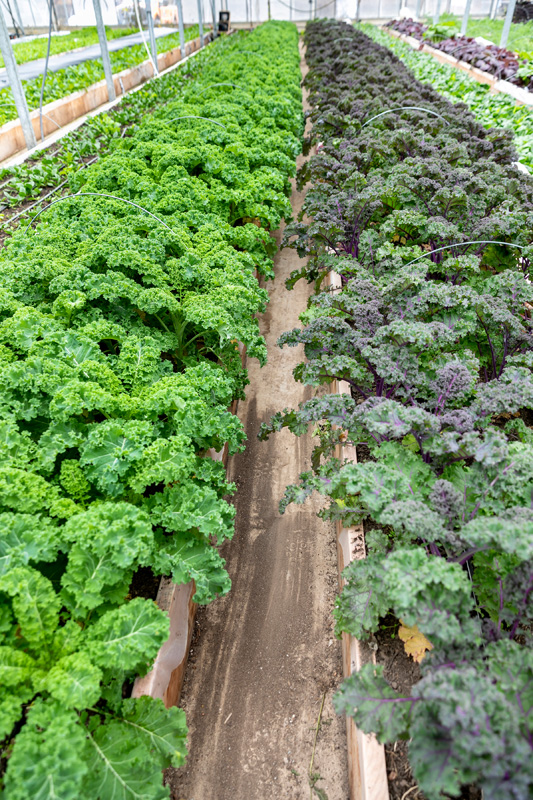
“In March 2020, we realized we needed to grow more food. Sadie was part of the team who pivoted and helped double our acreage,” Noli adds.
“In summer of 2020, I also worked with Katie Ruppell on the community lunch program, making meals in the MVRHS big kitchen, and then we would use the culinary kitchen to organize and distribute the food. And I also worked with Ali Fish and the Mobile Market,” Sadie says.
“Sadie was busy,” Noli says, laughing.
When schools started back up in the fall of 2020, Sadie learned that her whole first year was virtual. “So I could continue to help out in the fall,” Sadie says. Due to studies ramping up, she had to pause her work for IGI in the spring of 2021, but was back to do an internship and support the summer lunch program again in 2021. When she graduated in June 2022, Sadie returned to IGI to serve as the special projects manager, working exclusively with Merrick on food equity. “When I first applied for my master of science in nutrition science, communication, and behavior change, I envisioned myself using behavioral science research to change how people thought about and approached dietary change,” Sadie says. “However, this changed when I learned to apply data to create efficient, equitable systems. I quickly realized what I was most passionate about was using research to increase the accessibility of nutritious food on a community level. I feel fortunate to have found my place at Island Grown Initiative, working to create equitable systems in the community I was raised in.”
Noli joined IGI in 2006. Her activism, and outreach in our community and in communities around the country, helps her wear the title of special projects director. When it comes to food equity, Noli is thinking on the macro level: how to expand the definition of food equity and build regenerative land care and food systems that consider climate change and Island food access in future big weather events. She is networking with Cape towns and New England farms so that they can shorten the food supply chain and move resources where they are needed most: “COVID taught us all about the supply chain. And how, when the food system is interrupted, we don’t always have food access.” She mentions the idea that if the ferries shut down or we lose our ports, markets will only have a few days of food on hand. Indeed, when Edible calls Andrea Donnelly, the new owner of Cronig’s Market, she estimates that they have about five days of food on hand. And that is it.
“We have to think about food security in a long-term way. How are we growing our food? Is it regenerative? Climate-supportive?” Noli says. She points out that IGI’s farm team, led by Tim Connelly and Andrew Woodruff, is so important. The farm serves as a kind of lab for IGI to work out better land management and food-growing systems. “We need to grow food in a way that is resilient, local, and stable,” Noli says. “We are identifying local farmers in New England, local producers, to create a system that will support and feed people — particularly those who are most vulnerable. Local is important, because it is going to be harder and harder to get the food from far away.” Noli smiles, “I know. It’s stressful when you start to think about all this. But so is food insecurity. We want to take the stress away.”
“And the stigma,” Merrick adds. “There is no shame in needing help. Everyone needs some kind of help at one point or another.”
As Edible talks with these three, we become convinced that IGI’s food equity effort will succeed for a few reasons.
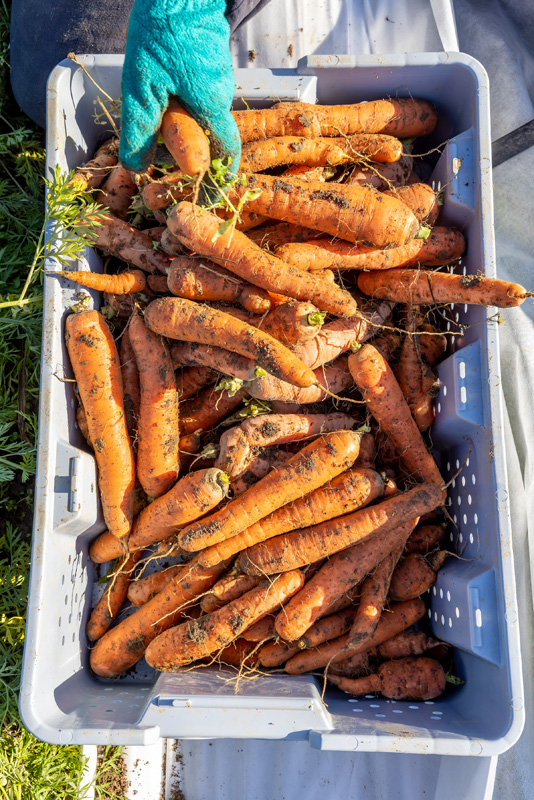
First, the IGI organization knows it cannot take on food equity in a silo, and so it is constantly forging partnerships with other Island and off-Island organizations working on the same issue. “There are so many organizations doing incredible work,” Sadie says. “Our partnerships are what make us strong.”
In fact, to date, IGI has 25 partner organizations, including the Councils on Aging, Kinship Heals, faith-based community suppers, Serving Hands, Community Services, healthcare providers, and schools. Merrick says, “It is an incredible community effort. And then there are our volunteers.” Three hundred and eighty-one people volunteered with IGI in 2022 — 195 folks at the Food Pantry, 70 people helping to process food, and 116 gleaners.
The second reason why IGI will succeed is that they know that while equity may be one problem, it takes many programs and approaches to address the need, and ensure that all Islanders have access to healthy food.
In 2007, IGI, under the leadership of IGI founder Ali Berlow, began its Island Grown Schools program, engaging with local farms, teaching children how food is grown, and talking about making healthy choices. “This work creates a new generation of children with a whole new relationship with food,” IGI executive director Rebecca Haag says.
“Having quality school meals is such a fundamental part of food equity,” Noli adds. “Then all kids have access to one or two good-quality meals every day of the school year.”
Since 2009, IGI has spearheaded an Islandwide gleaning program, working with Island farms and volunteers to harvest surplus crops or receive food grown specifically for donation. In 2022, IGI gleaned 48,092 pounds of local food. This amounts to 356,290 servings of fresh fruits, vegetables, and proteins. Approximately 27,000 pounds of that was grown on Island Grown Initiative’s farm. IGI distributes gleaned food to schools, senior centers, the Island Food Pantry, Serving Hands, the Wampanoag Safe Harbors Program, Kinship Heals, and IGI’s prepared meals program.
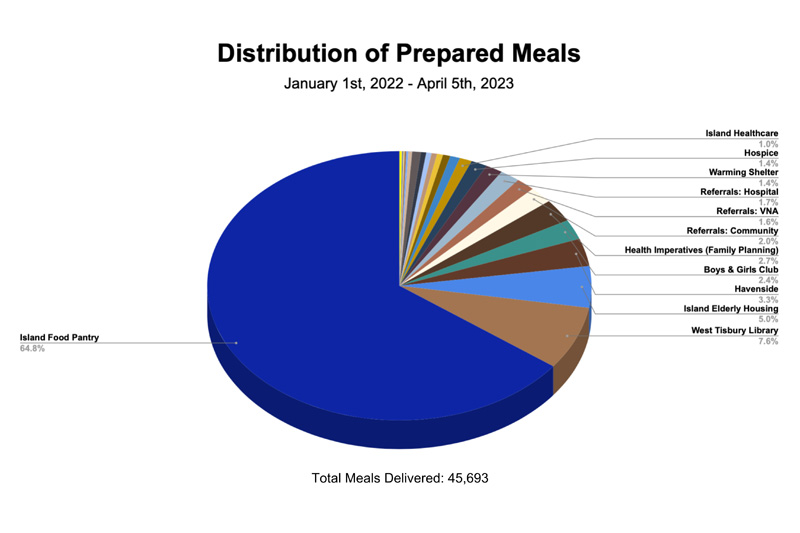
In 2012, IGI received the gift of Thimble Farm. As we have already said, this is a hub for learning. Beyond serving as a lab, it hosts a community garden, and is where IGI began to really address the idea of food access, growing food for the community.
In 2017, IGI launched its Mobile Food Market, which brings fresh produce to West Tisbury’s Howes House on Tuesdays from 3 to 5 pm, and St. Augustine’s Church on Thursdays from 3 to 5 pm in July, August, and September. Supplemental Nutrition Assistance Program (SNAP) benefits can be used at the Mobile Food Market truck. Healthy Incentive Program (HIP) dollars are redeemed when individuals spend SNAP money on local fruits and vegetables through prepared vendors. Depending on family size, beneficiaries can redeem up to $80 of SNAP back onto their cards through HIP redemption, which is pretty cool. In 2022, the Mobile Market ran from June 10 to Oct. 20, with a total of 1,058 transactions. Regarding assistance program sales, $1,019 HIP dollars and $432.50 of Farmer’s Market Nutrition Program coupons were redeemed. The total assistance program usage was 10.5 percent of all sales. This year, the Mobile Market is scheduled to run July through September. The schedule will be posted on IGI’s website and social media pages as soon as details are finalized.
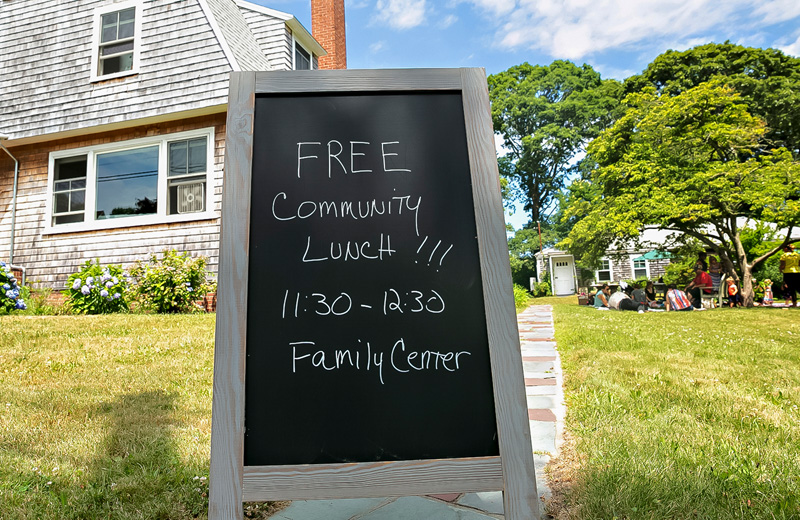
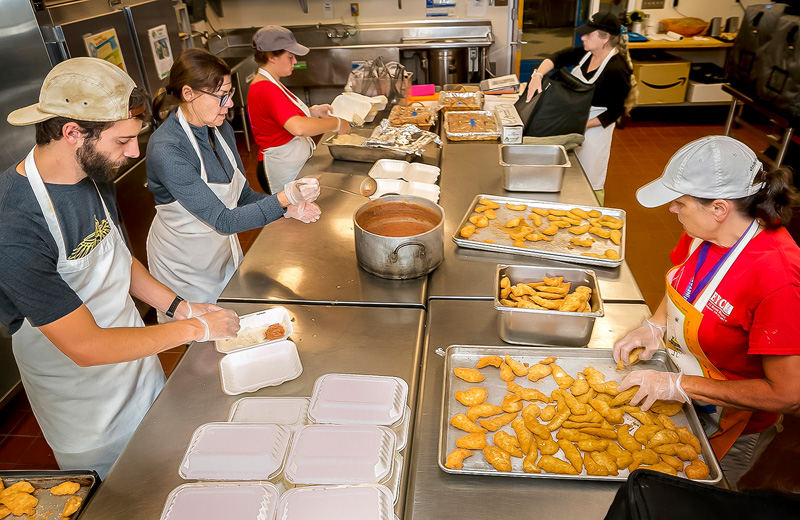
IGI also started its community lunch program in 2017, offering free lunches to children under 18 in July and August. Now these lunches are available to families at all the libraries across the Island, Monday through Friday during the summer months. Last year, the program ran for six weeks and provided 10,200 lunches. This is approximately 340 every day, Monday through Friday. In 2021, the program ran for seven weeks, and provided 11,760 lunches, and in 2020, the program ran for six weeks and provided 7,142 lunches. Because the distribution of these lunches is unmonitored, and some individuals did not take advantage of these lunches every day, IGI says it can conservatively estimate it served approximately 500 unique individuals in the summer of 2022. It also estimates that approximately 90 percent of the individuals eating these lunches are children, meaning the community lunch program serves approximately one in five of the schoolchildren on the Island. Island children and families can access these meals through the Boys and Girls Club, YMCA summer programs, M.V. Community Services, the Family Center, MVCS daycare programs, summer school programs, and individual family pickups. Lunches are also provided via Island Elderly Housing, the West Tisbury library, the Oak Bluffs Council on Aging, and more. For the summer of 2023, IGI plans to offer the community lunch program for eight weeks, July 3 through August 18. Lunch will be distributed across the Island at the Edgartown, Oak Bluffs, Vineyard Haven, West Tisbury, and Aquinnah libraries.
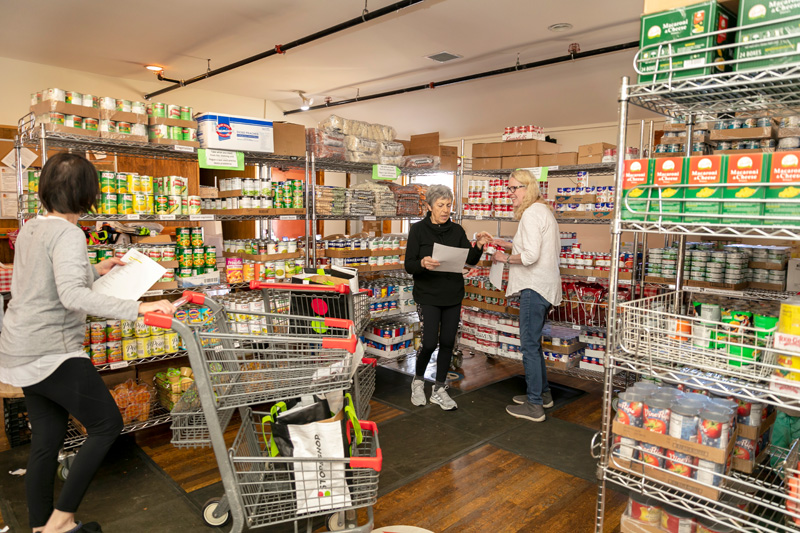
In 2021, IGI joined efforts with the Island Food Pantry, expanding on the idea of offering fresh, prepared, and shelf-stable foods for all. Now that IGI has recently purchased Jan Burhman’s Kitchen Porch, a commercial kitchen, it can make even more meals. In 2022, Island Grown prepared and distributed just over 40,000 meals. Sixty-three percent went to the Island Food Pantry, with the remaining 37 percent being distributed through partner locations like Hospice, M.V. Community Services, Island Health Care, the Councils on Aging, the West Tisbury library, Island Elderly Housing, Havenside, and more. And in 2023, IGI plans to prepare 60,000 meals. These meals will feature local produce and meat from IGI’s farm and gleaning program, and generous donations from partner farms, including Slough Farm and Wise Owl Farm. As it is operating out of the new, year-round kitchen, it is able to increase the types, sizes, and nutritional value of the meals offered to better meet the needs and preferences of clients.
But as IGI ramped up food production with the purchase of the commercial kitchen, it ran into a new issue: where to store all the prepared food? To solve this, IGI has just purchased a building in Oak Bluffs that can hold larger quantities of refrigerated and frozen food, as well as more dry goods. This means more gleaned food can last longer as well.
“We’re trying to do this better and better,” Noli laughs. “I used to feel so good about giving seniors a whole fresh butternut squash, but then I learned that a whole squash was too much food for one. And, if you have arthritis, they can be hard to peel and chop.”
“Wait, they’re hard for me to chop too,” Merrick laughs, adding, “It’s about ease and accessibility.”
“The work also feels good,” Sadie says.
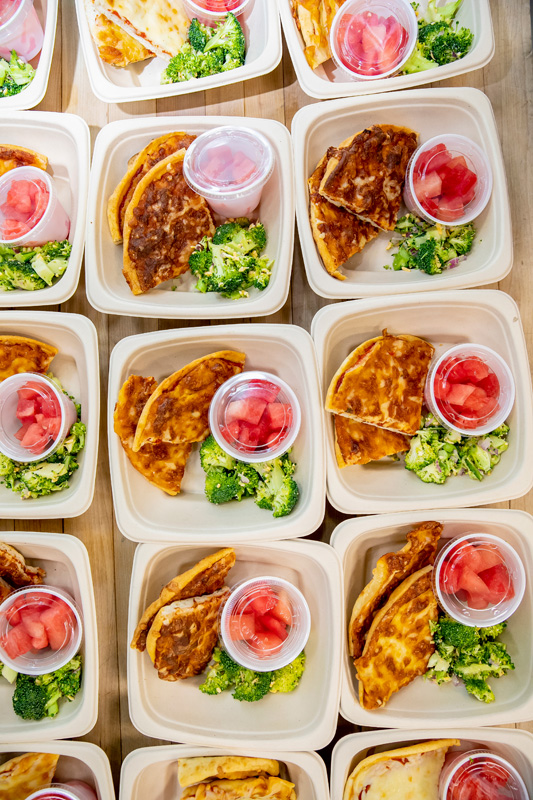
Noli continues, “Yes. Now we can offer portions of frozen, chopped-up squash, a squash soup, or even baby food. And we’ve gotten feedback from some of our families that they want rice and beans and more meat incorporated into our prepared meals. So we’ve added that. I had some the other day for lunch. It was so good.”
Noli and Merrick nod in agreement. A few hours later Noli sends us IGI’s Food Security Google Sheet document. She writes, “There’s a lot to it, and a lot of partners at the helm here. It might warrant a whole separate story, but I wanted you to get a sense of the scope of work ahead of us to help safeguard future food security, especially for those most vulnerable, in our changing climate.”
It’s true, there is a lot to the plan — pages and pages of issues that need to be addressed, actions to take, partners it is working and will work with, networking strategies, mentorship opportunities, training, and infrastructure necessities. It demonstrates deep, connective thinking. And it is clear that the organization is trying to be regenerative, so it can keep refining as it expands.
“My greatest hope for the future is that we are able to establish a secure, consistent, resilient food system. For everyone, but especially for those most vulnerable people. Climate change impacts are going to hit them first. We need the help of everyone else — volunteering, donations, buying from the mobile market. We are not afraid of tackling big-picture problems. This is why we are instrumental. We have the capacity to handle big-picture issues,” Noli says, and then sighs: “It’s so exciting, and I believe we can do it.”
So do we.
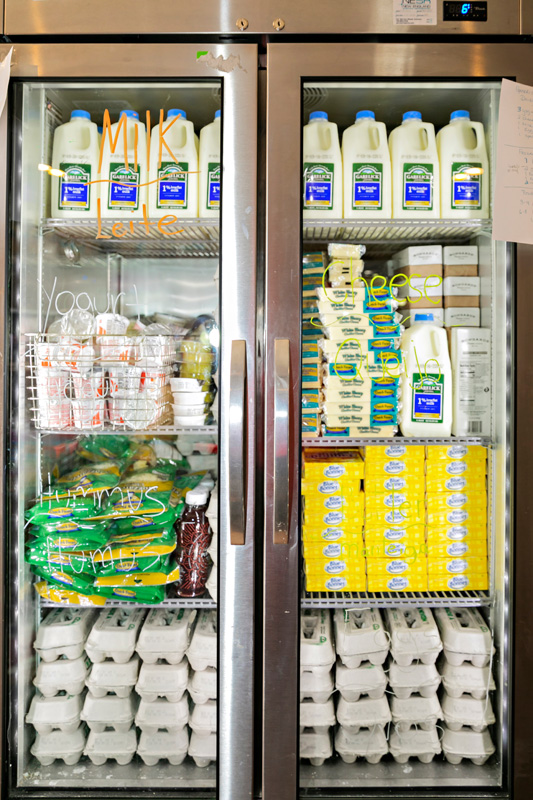
Food Pantry hours
- Monday, 2 – 4 pm
- Wednesday, 1 – 6 pm
- Friday, 12 – 2 pm, for seniors
- Saturday, 10 am – 12 pm
Note: On Tuesdays, the pantry receives food and puts it in bags. On Thursday, the pantry delivers food to about 50 people a week.
How to help
- Donate. Go to igimv.org.
- Help make meals.
- Glean. Spend time outside with friends picking vegetables.
- Volunteer at the Food Pantry,
- Work at a community lunch.
Find a community lunch
Community lunches will be available at these libraries Monday through Friday in July and August:
- West Tisbury library
- Vineyard Haven library
- Oak Bluffs library
- Edgartown library
The Aquinnah library will serve community lunches on Tuesdays and Thursdays.

